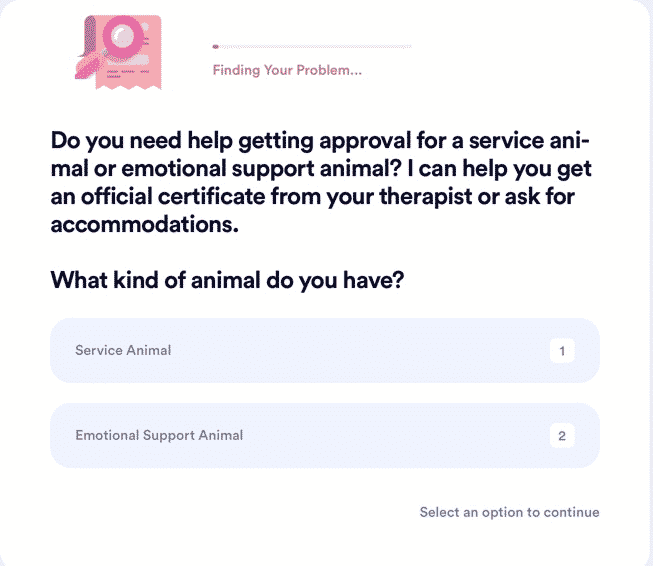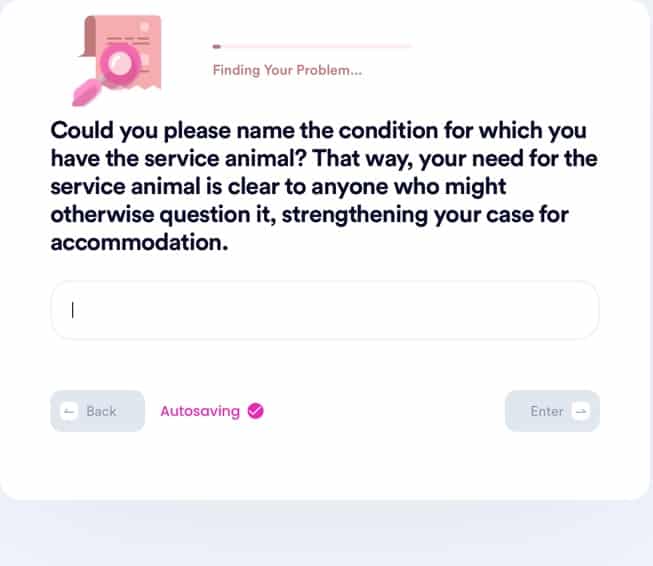Maryland Laws on Emotional Support Animals
Your mental health contributes to your physical health and quality of life. The maintenance that goes into it looks different for everyone.
For some people, it's therapy, medication, or a combination of the two. For others, an emotional support animal may make its way into the equation, but it can be difficult to get approved for one. If you are interested in getting an , DoNotPay can help.
Differences Between Emotional Support Animals and Service Animals
Emotional support animals are those not physically necessary for owners to complete their daily tasks. They differ from therapy dogs because they do not require certification of their training. Where therapy dogs must be certified by a national organization in their own right, you as the owner of an emotional support animal need a letter certifying your need for the animal.
Service animals have more rights granted to them as they perform tasks to maintain the handler's physical health. While dogs are the most common service animal, Maryland has not put any restrictions on the type of service animals covered by state law. If you identify your animal as a service animal, but it is not immediately apparent what purpose they serve, you may be asked the following questions:
- Is the animal required to manage a disability?
- What tasks has the animal been trained to perform?
Federal law prohibits public entities, which include employees of government services, from asking about the nature of your disability.
Laws Governing Emotional Support Animals in Maryland
Situations Where Emotional Support Animals May Be Accommodated
There are several situations where accommodations must be made for service animals and may be extended to emotional support animals. These include:
| Housing | The Office of Fair Housing and Equal Opportunity has extended the right for accommodation to all assistance animals. This means that you may have pet policies and fees waived to ensure that you have equal access to housing. While your landlord cannot ask about your disability directly, you may be asked for documentation to verify the need for the animal. |
| Places of employment | Making allowances for your emotional support animal may be considered an accommodation under the Americans with Disabilities Act. |
| Schools | Emotional support animals may be accommodated in schools on a case-by-case basis. |
| Businesses | There is an increasing number of businesses allowing dogs on their premises whether they are assistance animals or not. |
Wherever your animal is allowed, you must be sure that they are not disruptive and that they do not leave your side. Even service animals and their handlers can be asked to leave if the animal causes a disturbance.
Who Can Write ESA Letters in Maryland
A licensed professional will evaluate you to see if you are eligible for an emotional support animal. You can get ESA letters from a number of health professionals, like your
- Primary Care Physician
- Psychiatrist
- Psychologist
- Counselor
- Social Worker
The most important thing about the source of your letter is that the issuing party is a licensed doctor or mental health professional. You can seek an emotional support animal for a number of conditions, including
- Anxiety
- Depression
- Post-Traumatic Stress Disorder
- Autism
An evaluation does not guarantee that you will get a letter. If you have already asked your current medical professionals for a letter and were denied, going to a second doctor may not help. Some offices will not issue letters if your regular therapist or doctor has already denied you a letter.
You may be charged separate fees for your evaluation and the letter itself. Be sure to ask how long your letter is good for. Some issuing entities will only write a letter for a fixed period of time, while others do not put limits on their letters.
Ask Your Landlord About Your Emotional Support Animal With DoNotPay
Through our new Service and Emotional Support Animals product, DoNotPay can help you with all of your ESA-related concerns, including contacting your landlord about your ESA, asking airlines about their accommodation options, and finding the most affordable online ESA-letter service.
In just three steps, you can make progress toward getting an :
- Search "service animal" on DoNotPay.

- Select the type of issue you need help with, including contacting your landlord about your ESA/service animal, asking your airline about ESA options, or requesting ESA/service accommodations at other venues.

- Answer a series of questions about your current situation and the details of your ESA/service animal, so we can generate the best results for you.

And that's it! Depending on your issue, DoNotPay will generate a letter to your landlord and mail it on your behalf.
Southwest, American, and United Airlines used to accept ESAs, and DoNotPay can contact the airline and get back to you with an answer on accommodations for your emotional support animal.
Navigate the Landscape With DoNotPay
Your right to accommodation ensures you the same access as everyone else, but it can be hard to understand what you're entitled to. Don't waste your time reading the fine print–use DoNotPay instead! We can cut down your research time on:
- Appealing parking tickets
- Getting compensation from airlines
- Filing warranty claims
- Filing neighbor complaints
- Fighting workplace discrimination
Try today to learn where else you can advocate for yourself.


